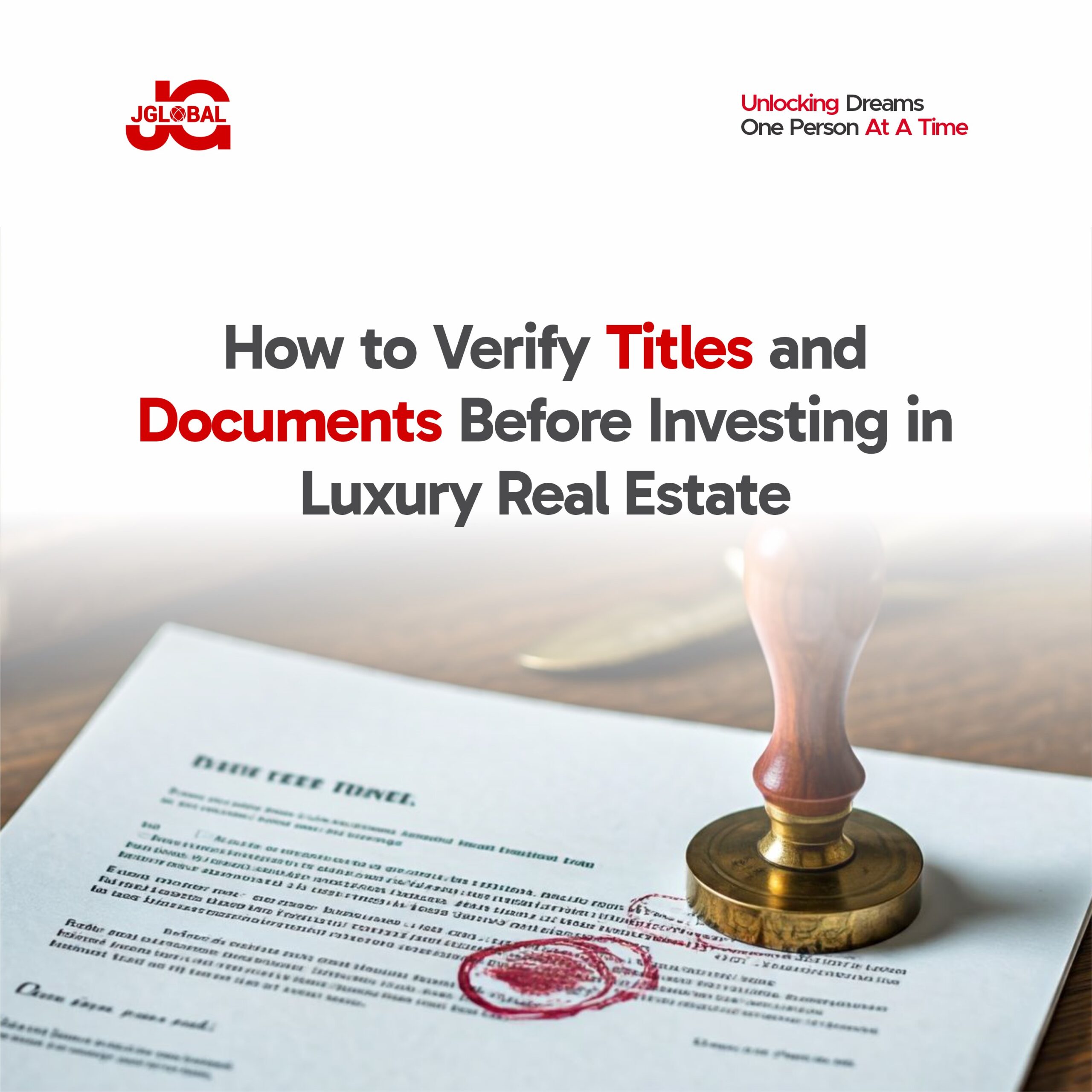How to Verify Titles and Documents Before Investing in Luxury Real Estate

When it comes to luxury real estate investment, one golden rule stands out: never pay for a property until you have verified the titles and documents. Luxury properties usually involve millions of Naira (sometimes dollars), and one wrong move could mean losing everything, hence the need to verify titles.
So, how do you protect yourself?
Let’s walk through the process of verifying titles and documents before investing in luxury real estate.
Why Title Verification Matters
In Nigeria, real estate fraud and land disputes are unfortunately common. Properties are sometimes sold without the proper approval, or even sold to multiple buyers at the same time. For high-end homes and apartments, the stakes are even higher because the investment value is large.
This is why title verification, which is the process of checking legal ownership documents, is very important.
It ensures that:
- The person selling the property actually owns the property.
- The land or building is not under government acquisition.
- There are no pending disputes, mortgages, or legal cases tied to the property.
- You can legally take possession without future trouble.
Skipping this step could lead to losing both the property and your money.
So what are the key documents you must verify when it comes to investing in luxury real estate?
Key Documents You Must Verify
When investing in luxury real estate, there are certain documents that prove ownership and legitimacy. Let’s break them down:
- Certificate of Occupancy (C of O)
This is the most recognized document in Nigeria that proves the government has officially granted you the right to use a piece of land for a set period (usually 99 years). Without a valid C of O, your claim to the property can be challenged.
Read more: What does a C of O entails?
- Deed of Assignment
This document shows the transfer of ownership from one party to another. It also provides a history of ownership so you can confirm whether the seller has the legal right to sell.
Read more: Everything you should know about the deed of assignment.
- Survey Plan
A survey plan clearly shows the boundaries, dimensions, and location of the property. It also indicates whether the land falls under government acquisition or is free from restrictions.
Read more: A comprehensive guide on survey plans.
- Governor’s Consent
Under Nigerian law, whenever ownership of land changes, the new deed needs the approval of the state governor. Without the Governor’s Consent, the transfer may not be recognized legally.
Read more: Understanding Governor’s Consent as a legal document.
- Building Plan Approval
If you are buying a completed luxury home or an off-plan property, check that the developer has received approval for the building. This ensures the property complies with zoning and safety regulations.

Example of a building plan from Roomsketcher. How to verify titles and documents
- Tax and Land Use Receipts
Properties in cities like Lagos and Abuja often come with land use charges. Confirm that the seller has paid these fees so you don’t inherit old debts. - Gazette
If the land was originally community land, a gazette proves that the government has officially released it for private ownership. It serves as a tangible proof for excised lands.
Get to understand Gazette in property ownership
Step-by-Step: How to Verify Titles Before Buying Luxury Property
Now that you know the documents and titles, here’s how to actually verify them:
- Get the documents first
Insist the seller sends all title documents (originals or certified copies) before you do anything. If they can’t produce them, treat that as a red flag. - Take a registered surveyor to the property
After the seller has sent the documents, bring your registered surveyor to the site. The surveyor will take the property’s GPS coordinates and confirm they tally with the survey plan and other documents you were given. - Verify at the state land registry
The surveyor should visit the state land registry to confirm the title is registered as shown in the documents, check for recorded encumbrances, and make sure the registry entry matches the seller’s paperwork. - Run a property search and environmental/government checks
The surveyor will do a property search to ensure the land is not along a canal, floodplain, or an area where the government has an interest. This step also checks that the site and any buildings comply with environmental regulations. - Check zoning and building approvals
Especially for luxury developments, confirm that the property is in an area zoned for residential or commercial use (depending on your investment purpose) and that any structures have been legally approved. - Bring in a property lawyer for a legal search
Your property lawyer will run a legal search to confirm the land or building truly belongs to the seller. The lawyer will show the chain of title (who owned the land before the seller), identify any legal disputes, and confirm whether the property has been used as collateral or is subject to any charges. - Confirm there are no financial or regulatory attachments
The lawyer will also check for outstanding financial obligations, mortgages, or public investigations (for example, checks that the property isn’t subject to enforcement action). If the property is owned by a company, confirm company records and signatory authority. - Cross-check everything and only proceed when satisfied
Compare the surveyor’s findings, registry records, and the lawyer’s legal search. Resolve any inconsistencies, get required consents (e.g., Governor’s Consent where applicable), and only move to payment or exchange of contracts once all checks are clean.
- Use verification services if needed
Platforms like Landsafe and Trustcrow now offer property verification services that can provide an additional layer of security.
Conclusion
Investing in luxury real estate can be one of the smartest financial moves you make but only if you take title verification seriously. Always remember: a beautiful house without proper documents is a legal trap.
By checking documents like the Certificate of Occupancy, Deed of Assignment, Survey Plan, and Governor’s Consent and by working with professionals you safeguard your investment. In luxury real estate, cutting corners isn’t worth the risk.
Before you sign anything or transfer money, verify titles. Your future self will thank you.
Related articles to read:
Understanding excision in property law



